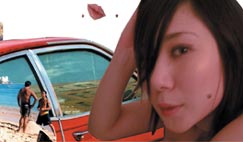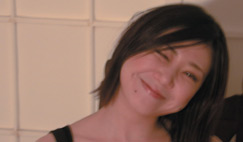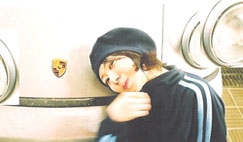
Lullabies from the other side [2002-11-30]Her third album is, according to me, the best release of 2002... In Hard ni sasete, Tujiko Noriko gives us a subtle mix of electronica and pop, accompanied with her beautiful fragile voice and flavoured with the proverbial Japanese weirdness.Melancholic lullabies from the other side of the world, really... Having left such an impression on me, it was only logical that I contacted Noriko about an interview. She quickly agreed and answered with much kindness and humour. m[m]: Your biography mentions that you started singing around 1978/79 (at a very young age) and that you bought your first synthesizer and sample in 1999. Did you have any other musical education? Did your parents encourage you to study music / singing? n: No, not at all. In 1979 I was 3 or 4. My parents wanted me to learn to play piano, but I didn't work. I was more interested in watching tv comedies and playing at school. m[m]: What was your first musical love in your childhood? n: Seiko Matsuda, Japanese biggest idol, her old songs are very nice. And "of course" it's more adult folk music. m[m]: 3 years later, what do you think of Keshou to heitai, your first album? n: Nice. Far from me, so close to me, strange, embarrassing, good, dreamy. m[m]: On your first album, the vocals were a bit "melodramatic" (I am thinking about Anti-Newton, Aru Choten or Komoriouta no mukougawa), you stopped singing that way. Did you get tired of it, or was it because that type of singing didn’t suit your new songs? n: I don't know, I just thought the way of singing is not so nice and changed or more naturally it just changed. m[m]: Keshou to heitai was quite pop, with just a few experimental passages. Experimentation is much more present now. When you recorded your first album, you just had bought a sampler a few months before, did the fact that you were quite new to that kind of instrument prevent you from doing exactly what you wanted? n: Yes, because sampler is quite simple. m[m]: Was there a personal desire to do more experimental music from the start? n: Not at all. I didn't and don't have a clear strategy of style of music. m[m]: Your first ever concert (in Kyoto) didn't go as well as planned... n: It was an all night event and my show was very late at night so till my turn came, I drank a lot, smoked a lot and spoke too much with a loud voice as the place was noisy. And magically totally my voice for singing had gone. At last I just played my cd and I pretended to be singing live, it succeeded, many people didn't think that I did such a terrible lie. m[m]: How did you get signed on Mego? n: I handed my music tape to Pita when he came to Tokyo. m[m]: You are very different from most Mego artists. The label has a very good reputation in glitch, noise and very abstract electronic music, how do you feel on it? n: Feel nice. m[m]: Were you familiar with the other artists work on the label? n: Yes a bit, only the albums that I could easily find in Japan. 
m[m]: What do you think is the main difference between Keshou to heitai and Shojo toshi? n: 23.5 years old and 25 years old m[m]: Is it really important for you to keep a balance between the experimental and the pop aspect of your music? n: Not at all m[m]: Shojo Toshi had some very calm, peaceful moments. Do you think it’s fair to say that Hard ni sasete is even calmer, sweeter, more peaceful? n: For me it was more sad and both are never peaceful like many people say. And you can say anything about these. m[m]: I think Hard ni sasete forms a much tighter unit than your previous album. Did you do it on purpose or is it just the way things went? n: Just the way things went. m[m]: If I'm not mistaken, quite a few of the sounds you're using are sampled outside, in the nature or in the city. Is your environment important, has it some influence on your music? n: Yes, of course, they are Tokyo girl's music. m[m]: How important were the guests on Hard ni sasete? Did they have an influence on the songs or did you tell them what to do? n: I told them what to do. And after that it was their own way. m[m]: People often compare you with Björk. How do you feel about that comparison? n: Everybody ask this question.
I don't feel bad nor good, I'm not surprised about it at all as I'm sure I'm not like her, maybe the choice is too limited to compare. m[m]: Some artists compose when they feel the need to. Others, such as Nick Cave, do write music as if it was a (nice) day-job, composing from 9 to 5 everyday of the week. What's your method? How do you work on your music? n: Not like Nick Cave, sometimes I don't make music at all, I'm addicted to being lazy, and once I'm able to be alone or into it composing , I'm addicted to work. 
m[m]: Would you say that being Japanese has a determining influence on your music? n: Of course yes. m[m]: How important are your lyrics? n: Very, very important for my motivation to make music, very important for the result. m[m]: Could you tell us, poor non-Japanese speaker, what do you lyrics deal with? n: In Hard ni sasete... Penguin boy, prostitute who wants to be like a fly in this shit, angel on a beach, my mom, infinite train, showgirl and robot who both have heavy make-up, line and name, empty, etc, etc. m[m]: Has there been a real evolution in the themes you're developing in your lyrics since the first album? n: What I want to sing is just changing. m[m]: You used to sing a bit in English, but with each album, less and less songs are sung in that language. This might surprise some people as you are signed on a European label and are getting a lot of good reactions from western people. Do you plan on using English again? Do you think, as I do, that singing in Japanese is an essential part of your music? n: Yes, as I can use well only Japanese, more than English more than sounds. Now for a show, Stereotypie by DACM I have to sing in English. m[m]: You perform live quite often. What is a Tujiko Noriko concert like? Are you alone, doing both the music and the singing? n: In Japan I perform with another musician a lot, it's fun. In the other countries I perform alone most of the time. I don't dance. I touch the laptop sometimes and I just sing. m[m]: You were born in Osaka, a city with a very lively underground music scene, then you moved to Tokyo and now you live in Paris. How important have these cities been to you and to your work? What do you like the most about each of those cities? n: Tokyo is the most important city for me and my music. Paris might be able to be like that too in some years. Osaka is too much for me, as it's my hometown.
Tokyo: Yoshinoya (junkfood restaurant), Roppongi, subway, highway, donkihote (sick supermarket), 24 hours people and shops, Shibuya, trash buildings, Tokyo is so dirty and so beautiful.
Osaka: people!, comedy,
Paris: strange people, too slow things, sweet. m[m]: Who would you like to work with? n: My mom, new Japanese film directors m[m]: You and your friends at Slidelab seem to have a very strong sense of humour (your album covers, the photos in the Hard ni sasete booklet, the strange title of your first album – which translate as "Make up and soldiers"). How important is it for you? n: They are so good friends of mine. I don't have a big interest in the magazine. I don't know we just want to have fun. Hard ni sasete has a little bit different cover in Japanese version, it's nice. m[m]: What is Ok Fred? n: A magazine. (Yoshihito is making it almost alone, I don't help him either, so the work on it is very slow!! But he wants to make it a weekly magazine... someday.) It features some topics that Yoshihito has an interest in, so don't you think it can't be a very famous and pop magazine? m[m]:The humour in your artworks is often contradicted by the very melancholic feeling of your songs. Is it a way of keeping a balance between different emotions? n: Yes, maybe 
m[m]: When The Wire reviewed Hard ni sasete, they said that it would be dangerous to stay with you for too long. Really? Are you that dangerous? People always say your music is "sweet" so are you sweet or dangerous? ;-) n: Yes yes, I read it too. Strange... I don't know why he wrote so. I'm really sweet I think! m[m]: Which Japanese artist (musicians, cinema directors, writers, designers, painters...) would you recommend us? n: I don't know many artists, but I'm proud of Matsumoto Hitoshi (downtown)'s works, now he or they can't make super cool comedy but before his works were super. I feel there is not much exciting new, fresh artists in Japan that I want to recommend to you now. m[m]: What's coming for you in the near future? n: Singing and making music in a show (dance?), Stereotypie by DACM, some work for a film by Thierry Jousse, act in a small Japanese film. An album for Tomlab early next year. m[m]: Am I insane if I say your album is the best of the year and that the last song of the album is the best song of the year? n: Wow!!!! I'm so happy to hear that. So it's nice that I made it. No no you are not insane at all. Pikopiko! Bye bye! François Monti
| 
